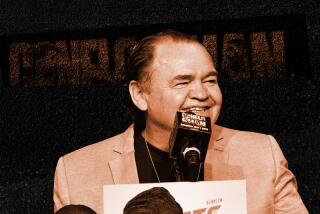‘The Little Professor’ Is From Old School
- Share via
He has been around so long, you’re tempted to ask Azumah Nelson what it was like to fight Willie Pep. Did he really tend to disappear in mid-fight? How about Abe Attell? Was he really a sucker for a left hook? Who was better--Benny Leonard or Jimmy McLarnin? How fast was Speedy Dado? Did he ever fight on the undercard of a Dempsey fight?
You can usually tell a guy who has been fighting for 20 years. He goes around bumping into telephone poles, listening to nonexistent birds sing, and he slurs his words and drools when he talks.
Not Nelson. He has all his teeth and eyes, and his ears don’t look like vegetables. He’s not Churchill, but you can understand every word he says. He doesn’t even have broken hands.
Which is remarkable because when Nelson began fighting, Gerald Ford was president. And the Rams hadn’t even moved to Anaheim yet.
It was so long ago, Jersey Joe Walcott was Azumah’s idol.
Nelson began fighting for the most basic of reasons: It looked like an easy way to make a buck.
It isn’t, of course, it’s one of the hardest. You put your brain on the line every fight. But growing up in Africa, in Ghana, on the site of what had been the Gold Coast, it beat digging in the mines or loading the copra boats.
Azumah’s first fight looked like a piece of cake. “I was bigger than him and I thought I would win easily. I didn’t. He beat me. He wasn’t stronger, he just knew more than me.”
It was a lesson Nelson took to heart. Boxing had to be learned. Like plumbing. Safe-cracking.
Nelson learned it well. The first thing he needed was a good cornerman. Azumah got the best. God. God is in his corner every fight, Nelson tells you. “God has blessed me. I put my life in his hands. God just asks that you do what is right.”
Accordingly, when Nelson, who owned a distillery in his home country, suddenly realized making whiskey was not God’s work, he gave it up. He didn’t sell it, he just shut it down. He didn’t want to be a dealer. He didn’t want to displease God. “People do bad things when they are under the influence of alcohol or drugs,” he decided. “I decided God would not like this.”
Nelson began fighting as a teenager in Accra. It was big-city Africa. He did not do his roadwork through prides of lions or herds of gazelles. “If you wanted to see wild animals, you had to go to the zoo,” he tells you.
He had his first pro fight in 1979. His career has thus spanned three decades and may persevere through four. He has fought on three continents. Have gloves, will travel. He fought the Spanish champion in Spain, the Puerto Rican champion in Puerto Rico, the English champion in England and the Texan champion in Texas. He would fight a shark in the North Atlantic if the price were right. He has fought 24 title fights over his career. He has lost only four fights in the 20 years.
Even some of these were questionable. He fought Pernell Whitaker in Las Vegas where Whitaker was more or less the “house fighter.” It was a bang-bang, too-close-to-call match. “It was like watching Willie Pep fight Willie Pep,” the crack boxing writer Mike Katz observed. Whitaker got the nod, somewhat to his surprise.
Nelson will fight Jesse James Leija on the Festival of Champions card in San Antonio (Leija’s hometown) at the Alamodome on July 11. It’ll be on pay-per-view nationally, so the country can see a genuine boxing artifact, a fistic heirloom, Azumah Nelson.
He’s a throwback. He goes back to the prehistoric pugilism days when the original Battling Nelson (known as the Durable Dane) fought from 1896 to 1923, Kid Lavigne fought from 1885 to 1908 and Joe Gans fought from 1891 till he died in 1910.
Nelson, who is somewhere between 35 and 50, says he will quit before it comes to that. Meanwhile, Azumah takes good care of Azumah. He weighed 126 pounds when he started fighting and he makes the lightweight limit (135) now. He fights Leija for the title on a card that has six world champions facing one another. “No tomato cans on this card!” boasts promoter Dan Goossen. “Tomato can” is modern fight-speak for “palooka.”
They used to call Nelson “the Terrible Warrior.” He didn’t care for it. God might not approve. He prefers “the Little Professor.” He doesn’t so much deal out punishment as he doles out lessons in life to his opponents. So long as they are conscious, that is.
“He is the best fighter ever to come out of Africa,” the publicist, Bill Caplan, trumpets. “What about Dick Tiger?” someone wants to know. “Azumah stops him in three!” proclaims Caplan.
Since Tiger weighed 168, this raises some eyebrows. But Nelson inspires this kind of hyperbole.
If Nelson is the “professor,” he wants to be tenured. Leija is just one more member of his student body, he shrugs.
I can see it now. The veteran fight fan will be in attendance at the Alamodome. He will squint at the action as Nelson goes after Leija. “You know,” he will say, “that guy reminds me of the old-time fighter Azumah Nelson. Moves just like him.” And his companion will say “Dummy! That is Azumah Nelson!”
More to Read
Go beyond the scoreboard
Get the latest on L.A.'s teams in the daily Sports Report newsletter.
You may occasionally receive promotional content from the Los Angeles Times.










